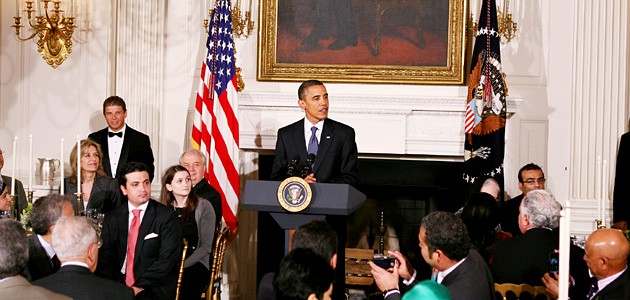If President Obama wants to convince Americans to support the ‘Ground Zero mosque’ he needs to tie it to our personal tolerance for other faiths.

OBAMA remarks last week in support of “the mosque at Ground Zero” and his rather lame parsing (“not commenting on the wisdom” of the project) the next day, President Barack Obama finds himself in the thick of it. For months he has stayed above this particular fray. (It was a local real-estate story, covered for months by the Tribeca Trib community newspaper and no one else; this president, who does “aloof” better than almost anyone, could have continued to say, as he did at repeated press briefings, that the mosque was a local story.) Now Obama needs to protect one flank against the Republicans who are using the controversy to garner votes in the midterms and in 2012. And he needs to protect the other from liberal Democrats, who see his second-day hedging as a capitulation to the craven necessities of politics.
The battle in which Obama finds himself is, beyond all the stagecraft, nothing less than a war over the nature of religion and religious priorities in America. In his speech Friday at the White House, on the occasion of the Muslim feast of Ramadan, Obama invoked Thomas Jefferson and the freedom of religion given to us by the Constitution. “Over the course of our history,” he said (over green salad, organic chicken, and potato-leek purée), “religion has flourished within our borders precisely because Americans have had the right to worship as they choose—including the right to believe in no religion at all.”
What he didn’t say—but implied—is that in America, the forces of assimilation and democracy historically overcome the forces of sectarianism and tribalism. It’s not that we have never before hated or feared our neighbors; it’s that, to paraphrase Dr. Martin Luther King: the arc of history bends toward justice. We end up embracing each other, or at least living peaceably together, because in the end we value being American more than we do being Congregationalist or Methodist or Quaker or Jewish or Catholic—or, as in the case before us, Muslim. This inexorable force of assimilation (as liberals like to say, “acculturation”) is our secret weapon.
Americans elected John F. Kennedy not because they stopped fearing Catholics but because Kennedy himself convinced us that it was against our principles to do so. We elected Richard M. Nixon—even though, as a Quaker, he might have been executed for his religious beliefs by the members of the Massachusetts Bay Colony in the 17th century. New Yorkers elected Michael Bloomberg as their mayor, a man who two generations ago would have been forbidden from joining any number of the nation’s best country clubs. We don’t care so much about who’s Catholic, who’s Quaker, and who’s Jewish anymore.
In America, this generosity regarding the religious beliefs of others is, on a personal level at least, almost completely pervasive. A 2008 study by the Pew Forum on Religion and Public Life found that a majority of Christian Americans believe there is more than one faith that can lead to eternal life. Even Christians who are taught in Sunday school that Jesus is the way, the truth, and the life—that is, the only route to salvation—actually believe something far more encompassing. We are threatened by our neighbors until, through forces of integration that seem more inexorable than gravity or erosion, our fears are quelled. Those Catholics, Quakers, and Jews whom our grandparents would have forbidden us to marry have become our roommates, our best friends, our spouses, our children.
Barack Obama—born to an atheist father with a Muslim family and a mother whom in today’s vernacular would be called “spiritual, not religious”—has been shaped by these forces. It is his belief that democracy actually trumps tribal alliances that led him, in his speech in Cairo last year, to proclaim to the Muslim world that “all people yearn for certain things: the ability to speak your mind and have a say in how you are governed; confidence in the rule of law and the equal administration of justice; government that is transparent and doesn’t steal from the people; the freedom to live as you choose. These are not just American ideas; they are human rights. And that is why we will support them everywhere.”
But Americans’ commitment to pluralism is unique even by Western standards. All over the world, sectarianism, tribalism, fundamentalism are on the rise. In Europe (ground zero for secular and atheist beliefs), immigrant groups of Muslims from Africa and South Asia express their religious beliefs in increasingly radical ways. In Israel, the voices of the ultra-Orthodox have grown ever louder and more powerful. In Africa, Christian fundamentalists and Pentecostals fight Muslim fundamentalists for the souls of the unaffiliated. Fundamentalism, in almost every case, is characterized by certainty on the part of the believer. The “many paths to God” consensus one finds at home is present almost nowhere else.
The most difficult bridge Obama must build, then, is not just among New Yorkers who may disagree about the location of a certain building. And it is not between the Western world and the Muslim world (though the Cairo speech is required reading here). It is between a view of God as exclusivist and one of God as bigger than that. In Obama’s America, democracy wears down religious differences. In many parts of the world, those differences mark the line between us and them, and sometimes life and death.